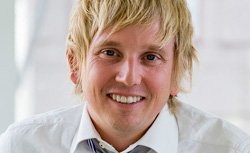Eric Ryan, Co-Founder of Method
How he's getting consumers to buy green cleaning products by marrying high-end design with environmental science.
When high-school friends and former roommates Eric Ryan and Adam Lowry started Method a decade ago, consumers had a gloomy, skeptical view of green cleaning products. There were a few green alternatives on the market, but they didn't work as well as their conventional counterparts, and they were ugly, more Birkenstock than Birkin. "Back in 2001, green cleaners were just hideous looking," the 38-year old Ryan says. "And the conventional wisdom was that green didn't clean."
The two thought they could tackle both problems at once. Lowry, with a degree in chemical engineering and a background in environmental science, formulated a dish soap and a line of all-purpose cleaners that were nontoxic and biodegradable. The sprays had pleasant fragrances like cucumber, a rarity at the time. Ryan, with an eye for design honed by jobs in branding at the Gap and Saturn, envisioned sleek, elegant containers (and coined a tag line the company still uses today, "people against dirty"). A partnership with designer Karim Rashid led to Method's big break, a 2002 distribution deal with Target. The next year, Method debuted a hand soap in what would become the brand's distinctive teardrop-shaped bottle.
Ryan says his idea was to bring a spa aesthetic into a formerly drab, industrial market. While some customers were certainly attracted by the idea of nontoxic, environmentally friendly cleaning products, most people just wanted soaps and sprays that didn't stink and that looked nice on the countertop.
Along with products like the Toyota Prius and the Sigg water bottle, Method has been central in persuading consumers—or at least a prosperous subset of them—to embrace environmentally friendly products as genuine alternatives and not just treat them as a slightly ridiculous luxury.
Ryan and Lowry have also shown that it's possible to run a financially successful green business. Method was named the seventh-fastest growing private company in the country in 2006 by Inc. magazine and now racks up $100 million in sales a year, and has been profitable since 2005. Method now has a lot of company in the green-clean niche. To stay a step ahead of the competition, Lowry and Ryan aren't afraid to experiment, even when the results don't pan out. An early attempt at breaking the mold, a wavy dish-soap bottle, is described as a "failure" of a product by Ryan because consumers misunderstood how its upside-down cap worked and tended to leave it off—and leaking soap—after opening it in the store to smell it. In spite of the mess, he says, "It really put us on the map" because of its quirky shape and spa-like scents.
Other efforts have been more successful. Last year, Method set its sights on reinventing laundry detergent and rolled out a super-concentrated, biodegradable formula that's dispensed by a pump, earning a Very Innovative Product award from Good Housekeeping. Ryan says an overarching commitment to sustainability gives Method an edge over companies that roll out green products on a piecemeal basis. The company aims to make its manufacturing, packaging, and distribution processes as earth-friendly as possible, using nontoxic, locally sourced product ingredients and shipping in biodiesel-fueled trucks.
This fall, Ryan and Lowry will go guru with their eco-entrepreneurial vision, dispensing their collective wisdom in a business book, The Method Method: Seven Obsessions That Helped Our Scrappy Start-Up Turn an Industry Upside-Down.
Follow Eric Ryan at @MethodGuy and follow Method at @MethodTweet.
Check out the rest of our business Top Right:
Troy Carter, business manager for Lady Gaga.
Do Won Chang, founder of Forever 21.
Jack Dorsey, founder of Twitter and Square.
Reed Hastings, CEO of Netfix.

